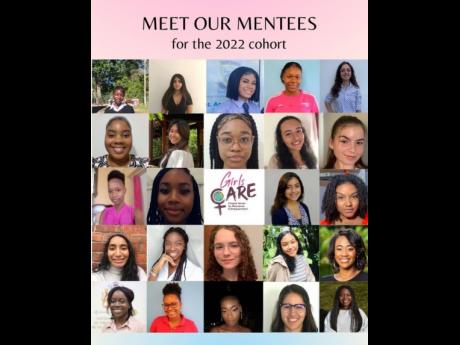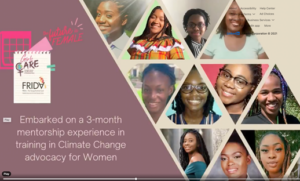Earth Today | Caribbean girls benefit from climate change mentorship initiative
TWENTY-FIVE girls and young women from across the Caribbean will, over the next six months, take a deep dive into climate change and its implications for the region, while exploring the linkages with the global feminist agenda and youth advocacy.
The group is being mentored under the Girls Climate Action for Resilience & Empowerment (GirlsCARE) programme – the brainchild of climate justice advocates Ayesha Constable and Jhannel Tomlinson.
“In the Caribbean, as with many countries in the global South, women and girls are championing climate action, but with structural and resource limitations which limit their reach,” the duo said in a release to the media.
“The aim of the programme is to enhance the capacity of the young women to continue their climate advocacy and amplify their collective voices globally,” they added.
The programme, which is being run online, is supported by a grant from the Clara Lionel Foundation, which has financed 18 climate justice organisations in the Caribbean to the tune of some US$15 million.
Ages 15-25 years old, the young mentees come from The Bahamas, Barbados, the Cayman Islands, Belize, Guyana, Jamaica, St Kitts & Nevis, and Trinidad & Tobago.
In addition to ‘Climate Change and the Feminist Agenda’ and ‘Youth-led Climate Action and Movement Building’, other topics they will look at include ‘Colonialism & the Climate Crisis, Climate Justice in Climate Action’, as well as ‘Loss & Damage and Future of Youth in the Global South’.
“The programme uses an intersectional approach to teach the young women how to approach climate action within a frameworks of climate justice and gender justice. The intersectional approach towards climate action is pivotal to ensuring gender-just solutions, accessible climate finance, and a just transition to achieve the targets of the Nationally Determined Contributions (NDCs),” Constable told The Gleaner.
NDCs are the voluntary targets set by individual countries to achieve reductions in their greenhouse gas emissions, which fuel global warming. Global warming, in turn, triggers climate risks and threats, including extreme hurricanes and droughts, sea level rise and the associated loss of coastline and livelihoods.
The goal, Constable explained, is to “refine their understating of the critical political, historical and economic issues in relation to the climate crisis” as they conduct group exercises and a final project to help build capacity and community for a “strong cadre of climate activists in the Caribbean”.
“Participants are linked to other existing regional and global networks and introduced to other opportunities to expand and continue their work. They are also encouraged to start locally led actions to transfer what they have learnt through the programme and scale up their current actions,” Constable explained.
RECENT REPORT
This initiative of GirlsCARE comes in the wake of the recent release of the Adaptation Fund report on A Study on Intersectional Approaches to Gender Mainstreaming in Adaptation-relevant Interventions. That report, published last month, champions the integration of gender and other sociocultural realities into climate change adaptation interventions.
Adaptation is especially important for vulnerable countries, including Caribbean small island developing states such as Jamaica, that have relatively low levels of greenhouse gas emissions.
‘… Intersectional approaches help shed light on the nature of multidimensional and intersecting gendered vulnerabilities to climate change. This lens deepens understanding of the particular vulnerabilities people experience, as well as what adaptation strategies (e.g., agricultural diversification, migration, collective action) would be available to them depending on other intersecting categories of privilege or marginalisation,” the report noted.
“In recognising people’s agency and resilience, intersectional approaches facilitate moving beyond a narrow focus on gender safeguards and prevention of gendered harm to proactively addressing how adaptation measures can promote gender equality, the empowerment and agency of women and girls of all backgrounds, and consider and address, to the extent possible, multifaceted gender differentiated vulnerability to climate change through support of the broader sociocultural and institutional changes necessary to sustain such progress beyond one-off interventions,” it added.
The latest report from the Intergovernmental Panel on Climate Change (IPCC) also points to the need for gender and other sociocultural safeguards in the response to climate change.
“Vulnerability,” explained that IPCC report, titled Climate Change 2022: Impacts, Adaptation & Vulnerability, “is exacerbated by inequity and marginalisation linked to gender, ethnicity, low income or combinations thereof, especially for many Indigenous Peoples and local communities”.
The IPCC is the United Nations body mandated to assess the science of climate change.
Source: https://jamaica-gleaner.com/article/news/20220324/earth-today-caribbean-girls-benefit-climate-change-mentorship-initiative



